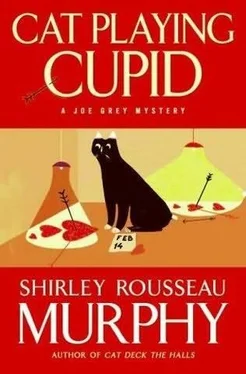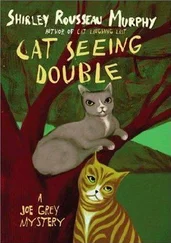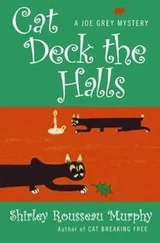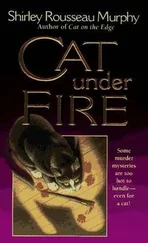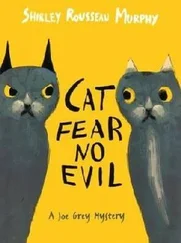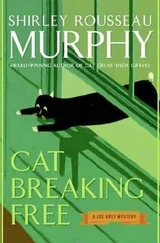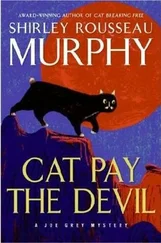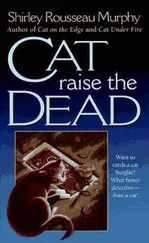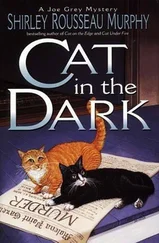The face of the mantel was set with blue and white tiles, each six inches square, each painted with a cat: cats hunting, cats sleeping, cats rolling over, everything a cat could think to do. But it was the cat on the center tile that held his attention. This was exactly the same cat that appeared at the Pamillon mansion, the rearing cat carved over the doors to the bedchamber. The same cat that was embossed on the dead woman's bracelet, rearing up with its paw thrust out in an attitude of austere command.
Joe stared at it for a long time, then he leaped to the top of a wooden crate, face-to-face with Ryan. "What did the dealer tell you about this?"
"Not a lot," she said, frowning. "What's wrong? I thought you'd be pleased."
"What did he tell you?"
"That the house was built by a cousin of the Pamillon family, the family that built the mansion," she said, gesturing in the direction of the hills and the old ruins. "What is it, Joe? What's wrong?"
"Charlie told you about the body up at the mansion?" Joe said.
"Yes, she called us." Ryan glanced out through the open tailgate at the neighbors' houses. "Let's go inside where it's private." She picked Joe up from atop the crate and slung him over her shoulder with a familiarity that both amused and pleased the tomcat. She smelled of cinnamon and of seasoned lumber. Heading inside, she set him on the couch and sat down beside him.
"What?" she said again, her green eyes searching his, wide with curiosity. "What about the mantel?"
"The cat in the center," Joe said. "The rearing cat. The body that the ferals found…It's wearing a bracelet with the same cat."
Ryan was silent, thinking about this. Clyde had sat down beside her and was holding her hand; he watched the two of them, saying nothing.
"And that cat is carved on a lintel, too, over a door of the mansion. The same cat as on the bracelet and on that tile."
Ryan looked at him for a long time. "I don't know what it means," she said, "but maybe we can find out. Charlie told me your plan-if that works, maybe we'll be closer to knowing what all this means."
"And?" Joe said nervously. " You think the plan will work?" Was she going to buy his idea? Or was she going to start hedging, saying it might not work, might be nothing more than an off-the-wall cat dream?
Ryan was silent a moment, then laughed and reached to pet him. "It's a great idea, Joe! It's inspired!"
Joe looked up at her and purred, and was glad Clyde had chosen, so well, their new housemate.
"I tell Dad I want to test Rock," she said, "to see if he has tracking potential. He'll say I'm crazy, that there's no point testing him until he's had some training, no matter how naturally talented he is, that I would never be able to teach Rock anything in one day, that it doesn't work that way." She sat very still, looking at Joe so deeply that he began to shiver. Then, "He'd be right, you know. It's absolutely nuts, no human could train a dog that way. But," she said softly, "I think maybe you can," and she grinned at him. "Let's do it. Let's go for it, Joe."
T HREE THINGS HAPPENEDthe morning after the honeymooners returned home. Ryan and Clyde and Joe Grey put the first step of Joe's plan into action-the vital, pivotal step upon which the success of the operation depended. Kit and Sage argued hurtfully, and not for the first time. And Kit discovered Ray Gibbs lurking behind Molena Point PD, looking around warily as he shoved something against the locked back door.
The cats' argument had begun the evening before at the Greenlaw home as Kit and her two humans, and Wilma and Dulcie and Sage, gathered for an early supper and a reading of the Bewick tales; it was that reading that sparked Sage's sullen response and Kit's anger.
The Greenlaw house was one story at the front but two at the back; the daylight basement had been converted to a separate apartment, which still stood empty, waiting for the right tenant. The view from both floors was of the village rooftops and the hills beyond.
Surrounding the house, Lucinda's garden shone bright with early spring flowers, but the evening was chill, and within the cozy rooms a cheerful fire burned on the hearth. As the Greenlaws and Wilma settled down for supper in the corner dining room, they looked out over hills awash in golden light as early evening tucked itself down around the village. Wilma had brought a salad to complement Lucinda's shrimp Creole, and for desert Pedric had baked a key lime pie. The three cats ate on the kitchen floor where they could splatter Creole sauce without regard for the rugs and furniture; already Sage's pale fur and white bandages were splattered with tomato sauce as if he'd just endured a second bloody encounter. Whoever said cats ate tidily hadn't seen these three, particularly when shrimp was on the menu. Only Joe Grey was missing; the tomcat was not a big fan of the ancient Celtic tales-and after supper, as everyone settled before the fire, it became apparent that Sage felt the same. As the humans sipped their coffee, and the cats licked the last splashes of Creole sauce from their paws, and Pedric read about doors that led beneath the green Celtic hills into under-earth worlds where lived cats that spoke like men, Sage grew increasingly uncomfortable.
The stories made Dulcie and Kit shiver with wonderful dreams, but Sage turned his back and curled up tight, his face hidden, not wanting to listen. Kit watched him, frowning.
Pedric read of cats appearing suddenly in ancient villages then disappearing, and the villages filling as suddenly with human strangers. His scratchy voice told of how an orphan child followed music from within a hill, and entered through a door carved with a rearing cat. "'And there,'" Pedric read, "'lay an ancient world, its sky as green as emerald, a world all peopled with cats who spoke like men.'"
But if Bewick's retold folktales made Sage uneasy, it was the author's own experiences with speaking cats as he rambled on a walking journey across Scotland that startled everyone, his encounters at crofts and farmhouses where the country families gave him lodging.
"'I had been, in this short tramp, particularly charmed with the border scenery; the roads, in places, twined about the bottoms of the hills, which were beautifully green, like velvet, spotted over with white sheep, which grazed on their sides, watched by the peaceful shepherd and his dog.
"'But it was the cats I met in that part of the country, the strange and unnatural cats that gave shocking credence to the folklore of the region. These were the speaking cats of legend,'" Bewick wrote, "'and one cat in particular, who lived in a small thatched cottage with an old grandmother, entertained me with the gossip of that region, telling stories of the weddings and births, and, purring slyly, telling me the misdeeds of his human neighbors; and he related heartrending tales, too, of the ferocious battles among the region's forbearers, where wars seemed a way of life.
"'But no war, no atrocity, nor wonder of the land itself, could match the amazing existence of that cat and of those four like him whom I met on my Scottish journey. Even the folktales which I have published herein cannot begin to match that wonder. And surely those stories were based far more on fact than most men could ever guess.'"
Wilma recognized passages that were the same as in the more common edition of Bewick's memoir, where the folktales and encounters with speaking cats did not appear at all. She'd never seen this rare composite, she hoped that perhaps Bewick had printed only very few copies. When Pedric closed the book, they were all wondering how many people over the years had read these same pages, how many well-meaning folk had shared Bewick's discoveries, not thinking how dangerously cruel such knowledge could be when passed on to others, how it could inflame human greed.
Читать дальше
